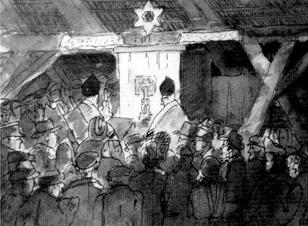
On June 13, 1943, John woke up knowing that he was going to be part of a very special ceremony – his bar mitzvah, the day when Jewish boys mark their passage from boyhood into the adult practice of religious activities. Synagogue services and parties usually mark the day. But not for thirteen-year-old John. Here in Theresienstadt, there would be no ceremony in a real synagogue, and no lavish celebration.
In Theresienstadt, religious ceremonies like bar mitzvahs were held in secret. No one wanted to bring too much attention to Jewish customs. While religious services were not flatly forbidden, they were not entirely allowed either. They just happened, whenever and however possible. Small “synagogues” were created in attic rooms throughout the prison. Rabbis from different towns and villages gathered their communities and held services when they could.
On the morning of his bar mitzvah, John dressed in the best clothes he could find. He borrowed a white shirt fraying at the collar. He tugged on his shirtsleeves. They were short, but they would have to do. His pants hung loosely around his waist, and he tried to ignore the hunger pangs in his stomach. These days, hunger was a daily occurrence. Thinking about it only made it worse.

An artist’s sketch of a religious service in the attic of one of the barracks. John had his bar mitzvah in a room like this one.
John reached into his pocket, feeling for the small gold pocket watch and the fountain pen, gifts from his father and mother for this special day. How had they ever managed to smuggle these things into the concentration camp, he wondered. He pulled out the watch and looked at the time. He had to finish getting ready. Quickly, he licked his hand and smoothed down his hair, then wiped a dirt smudge from his cheek. He took a deep breath and moved outside his barracks, climbing the narrow stairs to the attic of a nearby building, where the ceremony would take place. On the way, he mouthed the Hebrew words he was about to recite, over and over. In the absence of prayer books, he had learned all the prayers by memory, working in secret for months with Rabbi Ferda to make sure his pronunciation was perfect.
As John entered the small, dimly lit attic room, his mother moved forward to give him a warm hug. “We’re so proud of you,” she whispered, squeezing his arm.
His father nodded encouragement, while his brother punched his arm playfully. “You’ll be fine,” said Karel.
John glanced around the room. There were only about ten people there aside from his family – mostly friends from Budejovice. A couple of the boys from his barracks were also there, offering moral support.
John moved to the front of the small room to stand next to Rabbi Ferda, who smiled, his gold teeth catching the light from a candle that glowed on the table.
“Welcome, everyone,” Rabbi Ferda began. “Today we are here to celebrate John’s bar mitzvah. I have had the pleasure of knowing John since he was a small boy, and what a fine young man he has become.”
John squirmed.
“Even though we are far from our home, our tradition is strong,” the rabbi continued. “The prayer that John will recite today begins with a statement of faith in the future. And that’s what we all must have.”
Faith in the future, thought John. After fourteen months of imprisonment in Theresienstadt, it was almost impossible to imagine a future. Would he ever go home again, back to his own room, not one he had to share with forty people? Would he ever return to a real school, play in a real park, or go to a movie theater? Would he ever have a full meal, and even seconds, instead of having to stand in line for a cup of watery soup and a lump of stale bread? It was so long since he had enjoyed these simple pleasures.

From Theresienstadt, John’s mother sent this postcard to her sister in Austria. She writes that they are all well, and she talks about John’s bar mitzvah. A few months later, the Freund family was transported to Auschwitz.
As Rabbi Ferda finished speaking, John took a deep breath, closed his eyes, and began to recite the Hebrew blessings. He sang his portion perfectly. Months of practice had paid off. His parents beamed with pleasure. Later, his mother sent a postcard to her sister in Austria, telling her that they were still well, and bragging about the wonderful ceremony for John. It would be the last message she would be able to send.